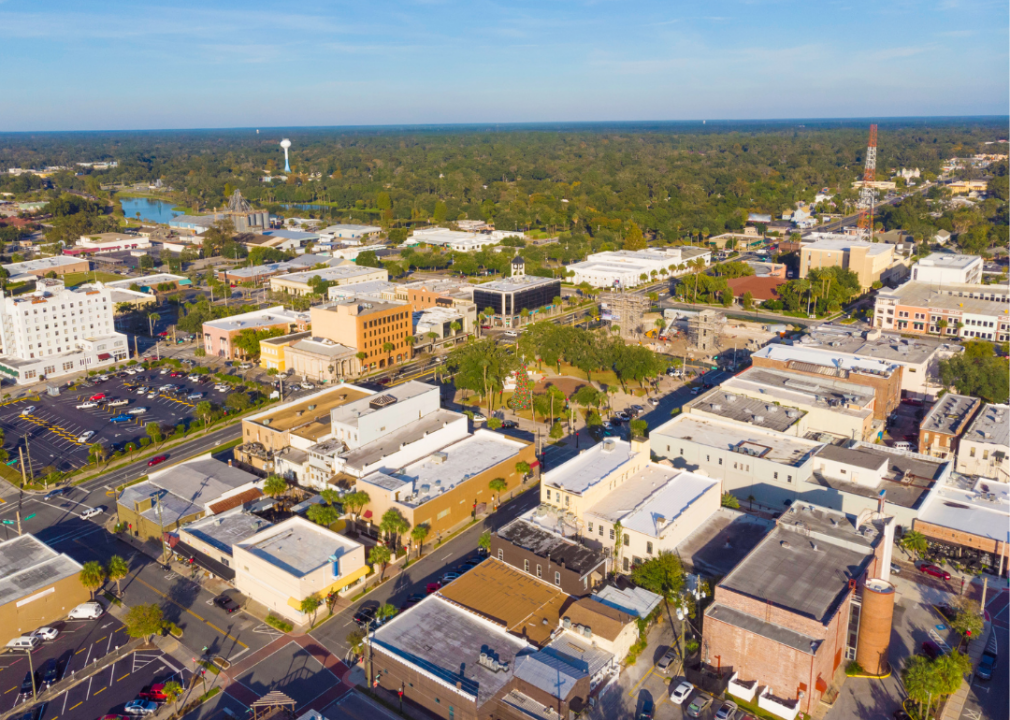When Purdue Pharma first began sales of OxyContin in the late 1990s, it was advertised as relief for cancer patients and people with chronic pain. Aggressive marketing fueled the drug's popularity, along with that of other opioid pain management drugs on the market. But as the company touted OxyContin to physicians, it downplayed the drug's addictiveness, according to confidential Justice Department reports obtained by news organizations, leading to widespread use that has fueled an opioid epidemic across the U.S.
More than 645,000 people have died from opioid-related overdoses between 1999 and 2021, according to the Centers for Disease Control and Prevention. Provisional data shows just under 80,000 people died in 2022 alone.
Recommended Videos
Opioid prescriptions have decreased dramatically over the past decade as physicians and public health officials learned about the dangers of OxyContin and other opioids prescribed for pain management. In 2020, the most recent year with data available, the national opioid dispense rate reached 43.3 per 100 people, the lowest rate ever recorded.
A 2022 study funded by the National Institute on Drug Abuse found that counties with higher dispensing rates had more cases of opioid misuse and dependence. The study suggested that reducing prescriptions at the local level can lower a community's rate of opioid abuse or misuse.
Other studies, however, have suggested that decreasing prescriptions may have fueled a new phase of the opioid epidemic: the rise of synthetics like fentanyl. In 2020, synthetics accounted for 82% of all opioid deaths.
It's also important to note that, as awareness has grown about the dangers of dispensing opioid prescription painkillers, more health care professionals are also prescribing medications like Suboxone–which contains buprenorphine and naloxone—for the treatment of addiction and opioid use disorders. While Suboxone is also an opioid medication, it works differently than typical opioid painkillers, blocking the effects of more powerful and addictive opioids to deter intentional misuse.
Using data from the Centers for Disease Control and Prevention, Ophelia broke down counties in every state with the highest opioid dispense rates. In the case of a tie, the county with the higher population and higher raw number is ranked higher. Data was available for 98% of counties in the United States. Overall in Florida, the opioid dispensing rate was 43.4 per 100 people, compared to 43.3 nationally.
Read the national story for additional historical context and see where other counties outside of Florida stand.

#50. Lafayette County
- Opioid dispensing rate: 22.4 per 100 people
--- 48.4% lower than state average
--- 48.3% lower than national average

#49. Franklin County
- Opioid dispensing rate: 22.6 per 100 people
--- 47.9% lower than state average
--- 47.8% lower than national average

#48. Osceola County
- Opioid dispensing rate: 23.3 per 100 people
--- 46.3% lower than state average
--- 46.2% lower than national average

#47. Miami-Dade County
- Opioid dispensing rate: 23.6 per 100 people
--- 45.6% lower than state average
--- 45.5% lower than national average

#46. Walton County
- Opioid dispensing rate: 29.4 per 100 people
--- 32.3% lower than state average
--- 32.1% lower than national average

#45. Flagler County
- Opioid dispensing rate: 29.4 per 100 people
--- 32.3% lower than state average
--- 32.1% lower than national average

#44. Saint Johns County
- Opioid dispensing rate: 30.4 per 100 people
--- 30.0% lower than state average
--- 29.8% lower than national average

#43. Calhoun County
- Opioid dispensing rate: 31.3 per 100 people
--- 27.9% lower than state average
--- 27.7% lower than national average

#42. Nassau County
- Opioid dispensing rate: 31.5 per 100 people
--- 27.4% lower than state average
--- 27.3% lower than national average

#41. Washington County
- Opioid dispensing rate: 31.9 per 100 people
--- 26.5% lower than state average
--- 26.3% lower than national average

#40. Broward County
- Opioid dispensing rate: 32.7 per 100 people
--- 24.7% lower than state average
--- 24.5% lower than national average

#39. Polk County
- Opioid dispensing rate: 33.7 per 100 people
--- 22.4% lower than state average
--- 22.2% lower than national average

#38. Saint Lucie County
- Opioid dispensing rate: 33.9 per 100 people
--- 21.9% lower than state average
--- 21.7% lower than national average

#37. Monroe County
- Opioid dispensing rate: 34.3 per 100 people
--- 21.0% lower than state average
--- 20.8% lower than national average

#36. Putnam County
- Opioid dispensing rate: 34.6 per 100 people
--- 20.3% lower than state average
--- 20.1% lower than national average

#35. Orange County
- Opioid dispensing rate: 35.7 per 100 people
--- 17.7% lower than state average
--- 17.6% lower than national average

#34. Highlands County
- Opioid dispensing rate: 36.6 per 100 people
--- 15.7% lower than state average
--- 15.5% lower than national average

#33. Manatee County
- Opioid dispensing rate: 36.6 per 100 people
--- 15.7% lower than state average
--- 15.5% lower than national average

#32. Columbia County
- Opioid dispensing rate: 37.8 per 100 people
--- 12.9% lower than state average
--- 12.7% lower than national average

#31. Seminole County
- Opioid dispensing rate: 37.9 per 100 people
--- 12.7% lower than state average
--- 12.5% lower than national average

#30. Collier County
- Opioid dispensing rate: 38.3 per 100 people
--- 11.8% lower than state average
--- 11.5% lower than national average

#29. Lee County
- Opioid dispensing rate: 41.5 per 100 people
--- 4.4% lower than state average
--- 4.2% lower than national average

#28. Palm Beach County
- Opioid dispensing rate: 41.7 per 100 people
--- 3.9% lower than state average
--- 3.7% lower than national average

#27. Okaloosa County
- Opioid dispensing rate: 43.0 per 100 people
--- 0.9% lower than state average
--- 0.7% lower than national average

#26. Jackson County
- Opioid dispensing rate: 44.6 per 100 people
--- 2.8% higher than state average
--- 3.0% higher than national average

#25. Lake County
- Opioid dispensing rate: 45.4 per 100 people
--- 4.6% higher than state average
--- 4.8% higher than national average

#24. Santa Rosa County
- Opioid dispensing rate: 46.7 per 100 people
--- 7.6% higher than state average
--- 7.9% higher than national average

#23. Clay County
- Opioid dispensing rate: 47.2 per 100 people
--- 8.8% higher than state average
--- 9.0% higher than national average

#22. Hillsborough County
- Opioid dispensing rate: 47.6 per 100 people
--- 9.7% higher than state average
--- 9.9% higher than national average

#21. Taylor County
- Opioid dispensing rate: 47.9 per 100 people
--- 10.4% higher than state average
--- 10.6% higher than national average

#20. Volusia County
- Opioid dispensing rate: 48.4 per 100 people
--- 11.5% higher than state average
--- 11.8% higher than national average

#19. Gulf County
- Opioid dispensing rate: 49.0 per 100 people
--- 12.9% higher than state average
--- 13.2% higher than national average

#18. Citrus County
- Opioid dispensing rate: 51.0 per 100 people
--- 17.5% higher than state average
--- 17.8% higher than national average

#17. Sarasota County
- Opioid dispensing rate: 53.5 per 100 people
--- 23.3% higher than state average
--- 23.6% higher than national average

#16. Brevard County
- Opioid dispensing rate: 53.5 per 100 people
--- 23.3% higher than state average
--- 23.6% higher than national average

#15. Holmes County
- Opioid dispensing rate: 54.3 per 100 people
--- 25.1% higher than state average
--- 25.4% higher than national average

#14. Levy County
- Opioid dispensing rate: 55.0 per 100 people
--- 26.7% higher than state average
--- 27.0% higher than national average

#13. Martin County
- Opioid dispensing rate: 56.9 per 100 people
--- 31.1% higher than state average
--- 31.4% higher than national average

#12. Marion County
- Opioid dispensing rate: 58.4 per 100 people
--- 34.6% higher than state average
--- 34.9% higher than national average

#11. Indian River County
- Opioid dispensing rate: 59.7 per 100 people
--- 37.6% higher than state average
--- 37.9% higher than national average

#10. Pasco County
- Opioid dispensing rate: 60.4 per 100 people
--- 39.2% higher than state average
--- 39.5% higher than national average

#9. Leon County
- Opioid dispensing rate: 61.4 per 100 people
--- 41.5% higher than state average
--- 41.8% higher than national average

#8. Okeechobee County
- Opioid dispensing rate: 61.7 per 100 people
--- 42.2% higher than state average
--- 42.5% higher than national average

#7. Charlotte County
- Opioid dispensing rate: 61.8 per 100 people
--- 42.4% higher than state average
--- 42.7% higher than national average

#6. Pinellas County
- Opioid dispensing rate: 65.2 per 100 people
--- 50.2% higher than state average
--- 50.6% higher than national average

#5. Bay County
- Opioid dispensing rate: 69.2 per 100 people
--- 59.4% higher than state average
--- 59.8% higher than national average

#4. Hernando County
- Opioid dispensing rate: 70.6 per 100 people
--- 62.7% higher than state average
--- 63.0% higher than national average

#3. Duval County
- Opioid dispensing rate: 76.5 per 100 people
--- 76.3% higher than state average
--- 76.7% higher than national average

#2. Escambia County
- Opioid dispensing rate: 81.9 per 100 people
--- 88.7% higher than state average
--- 89.1% higher than national average

#1. Alachua County
- Opioid dispensing rate: 94.2 per 100 people
--- 117.1% higher than state average
--- 117.6% higher than national average
This story originally appeared on Ophelia and was produced and distributed in partnership with Stacker Studio.
